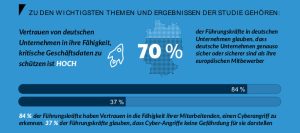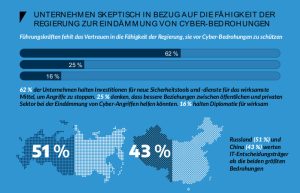
The majority of executives in Germany consider their company to be well positioned when it comes to IT security - despite costly security incidents in almost half of those surveyed. A study by Arctic Wolf.
A recent study by Arctic Wolf, a leader in security operations, shows that seven out of ten (70%) German executives believe their companies are as secure or more secure than their European competitors when it comes to IT security. In addition, 84% have confidence in their employees' ability to detect a cyber attack. Despite this generally high level of confidence in their own cyber defenses, almost half (45%) of the companies surveyed have suffered damage of at least 86.000 euros in the last twelve months in connection with a security incident. In addition, less than half of companies (42%) conduct safety training more than once a year.
Study of 1.700 IT decision makers
Arctic Wolf's study surveyed 1.700 IT decision-makers and executives worldwide, 300 of them from Germany, and was conducted by Sapio Research. After a year of spate of cyberattacks, the survey data shows how executives feel about various cybersecurity and business issues.
Companies willing to pay ransom despite trust in security defense
IT decision-makers and executives in Germany have great confidence in the IT security measures of their companies. 70% believe their company is as safe or more secure than their European competitors. Furthermore, almost four out of ten (37%) executives believe that cyber attacks pose no threat to them at all and that, although threats and security incidents have increased significantly over the past year.
Despite the general belief, almost 60% of executives would be willing to pay at least 50.000 euros to threat actors to resume business operations, for example in the event of a ransomware attack. Only one in four (26%) companies said they were not at all ready to pay the ransom. 30% of respondents also admitted that their company knowingly concealed a security incident to protect the company's reputation.
“Fast-changing cyber threats and a false belief in IT security create an enormous, often hidden business risk. Unfortunately, many companies are not aware of these risks before they are hit by a cyber attack," said Dr. Sebastian Schmerl, Director of Security Services for EMEA at Arctic Wolf. “People who rely solely on implementing proactive security controls to secure their organization run the risk of overlooking risk—both in mindset and design. Today's highly complex IT infrastructures and the impossibility of 100 percent preventive protection against attackers underline the importance of security operations. These are critical to setting up 24×7 threat monitoring and response. In this way, security incidents can be identified quickly, appropriate measures can be taken and costly attacks can be avoided.”
Skepticism: Government's ability to contain cyber threats
Despite the ongoing geopolitical discussions about ransomware, only 16% of business leaders believe diplomacy is an effective way to contain cyberattacks. On the other hand, 25% believe that better relations between the public and private sectors could help contain the cyber crisis.
Fears of nation-state attacks persist, with Russia overtaking China as the biggest threat
More than half (51%) of executives in Germany rate Russia as the source of the most dangerous cyber threats for their company. China (43%) is ranked as the second highest threat. In comparison, less than half of UK and North American executives (41%) rank Russia as the most dangerous nation-state in terms of cyber attacks.
More at ArcticWolf.com
About Arctic Wolf Arctic Wolf is a global leader in security operations, providing the first cloud-native security operations platform to mitigate cyber risk. Based on threat telemetry spanning endpoint, network and cloud sources, the Arctic Wolf® Security Operations Cloud analyzes more than 1,6 trillion security events per week worldwide. It provides company-critical insights into almost all security use cases and optimizes customers' heterogeneous security solutions. The Arctic Wolf platform is used by more than 2.000 customers worldwide. It provides automated threat detection and response, enabling organizations of all sizes to set up world-class security operations at the push of a button.


